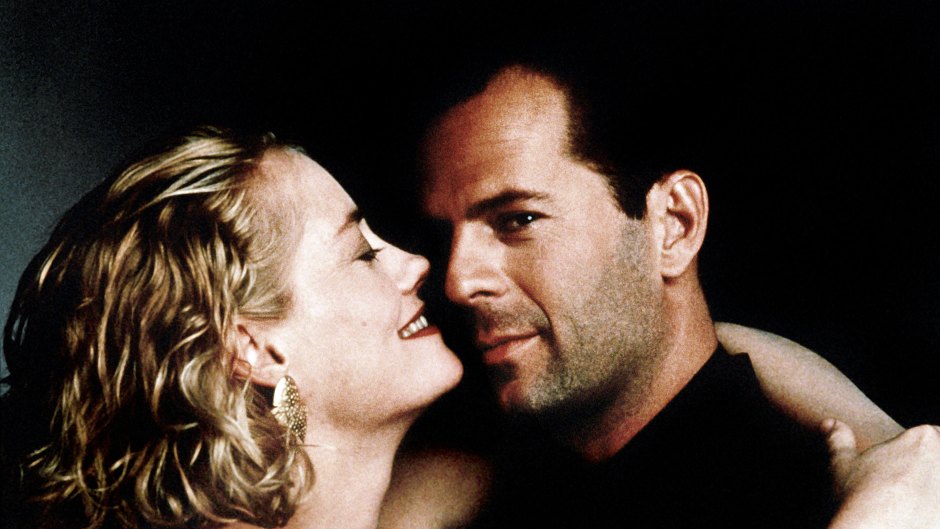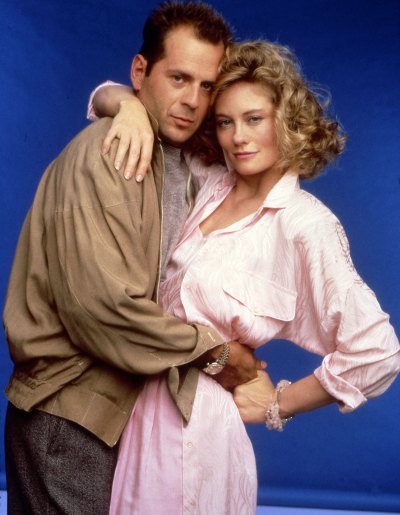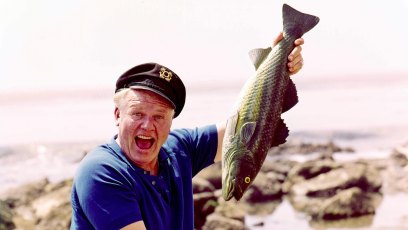
Abc-Tv/Kobal/Shutterstock
Here’s What Happened to ‘Moonlighting’ Stars Cybill Shepherd and Bruce Willis Before and After the Show
Back in the ’80s, we had plenty of TV shows where the big question was whether or not the two leads would “do it.” There was Sam Malone (Ted Danson) and Diane Chambers (Shelley Long) on Cheers, Remington Steele (Pierce Brosnan) and Laura Holt (Stephanie Zimbalist) on Remington Steele and, of course, David Addison (Bruce Willis) and Maddie Mayes (Cybill Shepherd) on Moonlighting. No question, it was the latter that burned the hottest (perhaps for the shortest time) of all of them.
Created by Glenn Gordon Caron, the show began with superstar model Maddie discovering that her accountant had wiped out her fortune and taken off for lands foreign to escape justice. Desperate to find some form of solvency, her lawyer informs her that she had invested in something called the Blue Moon Detective Agency as a tax write-off. She heads over to the office and finds that it, and its manager, David, are a joke — an agency not really designed to solve anything. Maddie decides that she has no choice but to do exactly that and, long story short, they start taking cases and working together. The result? Comedy, action, drama, tons of overlapping dialogue, double and triple-entendres, breaking the fourth wall to make comments to the audience and, most importantly, genuine chemistry and sexual tension between the two characters. It was so unique a mix for television that it’s hardly surprising that its shelf life was so short, but the connection it made with the audience was powerful.

In an interview with paleymatters.org, Glenn reflected, “I say to people, ‘You watch Moonlighting and you remember it being very, very funny. But it’s also filled with ache,’ in the sense that he — even though he was loathed to admit it — was very attracted to her and couldn’t quite make sense of why. And she, likewise, was very clearly attracted to him, but couldn’t in any rational way explain it. But that’s the voodoo of love, and I think I was trying to make sense of all that in my own head. I’m sort of a cockeyed romantic, I suppose. I directed a movie years later with Debra Winger, and she said to me, ‘All you do is men and women,’ and I thought about it, because I never thought about it that way before, and she said, ‘It’s not a criticism. The only stories worth doing are men and women.'”
Speaking with Closer Weekly, Cybill reflected, “When I met Glenn Gordon Caron, I said, ‘I know what you’ve written: a Howard Hawks-ian comedy’ like His Girl Friday. We talked that fast. Also, the key was that Bruce Willis and I had great chemistry, but we never consummated it, because that can breed contempt.”

In a biography written about the actors — Cybill & Bruce: Moonlighting Magic — Bruce is quoted as saying, “Cybill is playing a straight man, and it can be a very thankless role. It’s hard to do it well and I think she is doing great work in this thing. Some people say, ‘The chemistry between you two is what really makes the show.’ But you can’t play chemistry. You can’t say, ‘OK, Cybill, now we’re going to play chemistry.’ I do what I do and she does what she does, and what comes as a product of that is what makes the show work.”
In tribute to the two people who brought Maddie Hayes and David Addison to life, what follows is a look back at the road that led them to Moonlighting and their journey upon going their separate ways.
Please scroll down for more.

Kobal/Shutterstock

Columbia/Kobal/Shutterstock

Columbia/Kobal/Shutterstock

Reed Saxon/AP/Shutterstock

Moviestore/Shutterstock

Drive Archive

Moviestore/Shutterstock

New Line/Kobal/Shutterstock

Moviestore/Shutterstock

Moviestore/Shutterstock

Moviestore/Shutterstock

Mark Reinstein/Shutterstock

MediaPunch/Shutterstock

Columbia/Kobal/Shutterstock

Warner Bros

20th Century Fox

Miramax/Buena Vista/Kobal/Shutterstock

Columbia/Kobal/Shutterstock

Universal Pictures

TriStar Pictures

20th Century Fox/Kobal/Shutterstock

Columbia Pictures

Abc-Tv/Kobal/Shutterstock








































